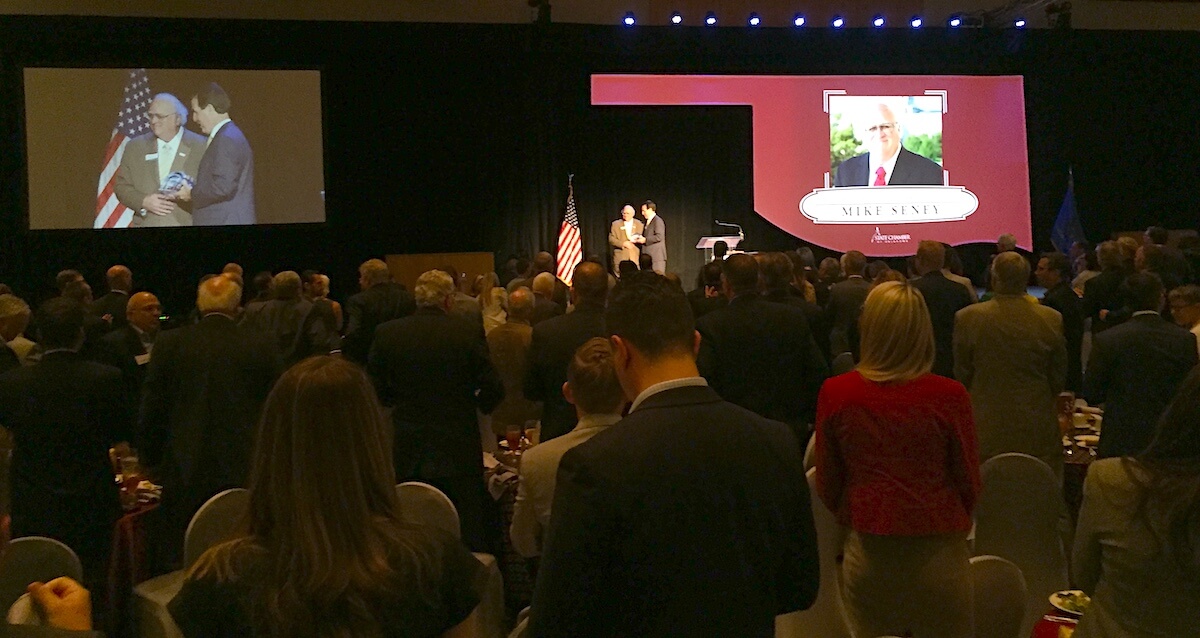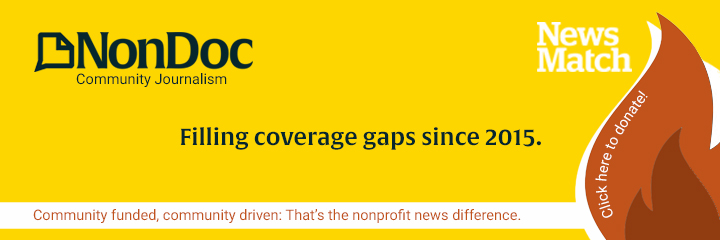If you’re a civically engaged Oklahoman, you’ve heard the stats: Oklahoma has the lowest regional teacher pay; Oklahoma incarcerates more women than anywhere in the world; Oklahoma has high rates of obesity, heart disease and diabetes; too many Oklahoma children grow up in poverty.
Frustrated by such lowlights, the Oklahoma State Chamber has launched an initiative called OK2030, which is aimed at finding big solutions to big problems.
“It’s been done in other states. About 20 other state chambers have taken this on to help create a strategic vision for their state,” said Oklahoma State Chamber president and CEO Fred Morgan after his organization’s annual meeting Wednesday. “There has been some frustration in the business community about where are we going as a state. What are are our goals? What are our objectives? In certain key criteria, why are we in the bottom 10 of states instead of being in the top 10?”
Morgan told a packed National Cowboy and Western Heritage Museum banquet hall that the OK2030 project is funded by his organization’s “Research Foundation,” which is currently collecting feedback about what problems are most pressing and what obstacles have inhibited solutions.
“It’s not a criticism of the political class, it’s really about, ‘Somebody has got to lead,'” Morgan said. “There’s got to be some leadership. I would argue the business community hasn’t necessarily led either. We’ve kind of reacted to how things happened instead of being leaders. So what I think [our members] are saying through OK2030 is they’re willing to try to step in and lead on some issues.”
During his speech, Morgan highlighted a three-year fundraising goal of $5 million for the effort. He said $1.5 million had already been pledged.
“We may have to run some Constitutional changes,” he told lawmakers, lobbyists, municipal chamber members and other assembled business people.

‘There are several things we need to fix’
Kristin Peck, vice president of public affairs for Cox Communications, serves on the Oklahoma State Chamber’s executive committee and spoke after the event about OK2030.
“We want to be able to attract businesses and attract residents here in Oklahoma. I’m a transplant to Oklahoma, and I love it,” Peck said. “I would love to see more people be attracted to this state, but when you get some of the national news that you’ve seen in our state, it might not seem as attractive as we know that it is. There are also just things we need to fix. Whatever the issue is, there are several things we need to fix, and we just aren’t getting there.”
Peck and Morgan both mentioned education as a focus.
“The education system is key to that, and it’s flawed,” Peck said. “When you hear the stories about people comparing what our teachers make compared to what teachers in other states make, why is that? What’s going on there? There’s been conversation for a long time on whether we should consolidate school districts. I don’t know. Should we? Is that something we should look at? And, if so, how come that’s something that hasn’t happened in the past? What is the barrier there?”
Some argue that low-tax policies favoring special interests represented by the Oklahoma State Chamber have helped create barriers to better state funding, but Morgan said solutions to the state’s biggest problems need to be about more than just money.
“Everybody should be part of the solution. That means financially, but also developing the policies behind it,” Morgan said. “For instance: a teacher pay raise. Are we just going to throw more money at a teacher pay raise, or are we going to make our education system better as we put more money into the system? So I think that’s how a business person would think. Health care. Are we just going to give more money to health care without trying to improve the outcomes? That’s the way business works. They measure outcomes, and they don’t keep investing in things that aren’t working. They try new models.”
Developing and implementing new models can take time, even when powerful forces are behind them. Incoming Oklahoma State Chamber chairman Sean Trauschke told Wednesday’s audience that OK2030 will move strategically. He joked about the effort’s name.
“OK2030 suggests it’s going to take 13 years to get something done,” said Trauschke, president and CEO of OG&E. “This will be a journey, and we’re going to make progress, but it’s not going to be overnight.”
Peck said the chamber wants to make Oklahoma “top of mind” when businesses are thinking about launching, growing or relocating, and she believes the state’s makeup can make that goal a reality.
“I’ve lived in a couple of other cities, and what I found absolutely amazing in Oklahoma is that everyone wants to move together in lock step,” Peck said. “The business community, the non-profit sector, the governments. The things like MAPS. That’s why I think this OK2030 will work in this state because everybody in Oklahoma is all about supporting each other and moving forward. It’s a special thing in Oklahoma.”





















